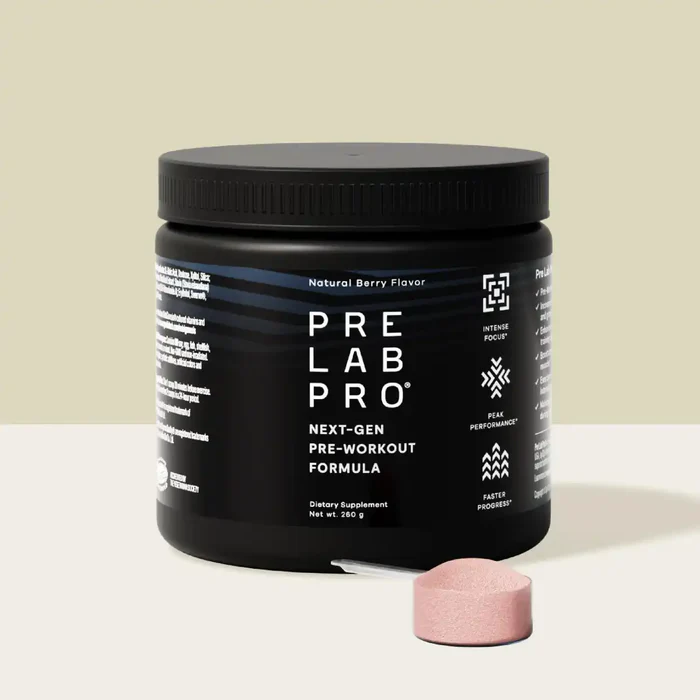Beta-alanine is one of the most popular sports supplements on the market. As more research emerges on the performance-enhancing benefits, more athletes and gym goers are adding this ergogenic aid to their supplement stack.
Though, like many other sports supplements, the mechanism behind their benefits can sometimes be complex and difficult to fully understand.
With taking any supplement, including beta alanine supplementation, it’s always a good idea to do your research on how it works in your body and how exactly it can help boost your performance.
This short guide provides you with the full run-down on beta-alanine - how it works in the body, how it enhances your training performance, side effects, dosage, and everything else you need to know!
Firstly, let’s run through what beta-alanine actually is.
Key Takeaways
- Beta-alanine is a non-essential amino acid that helps your muscles buffer acid during hard exercise.
- It works by raising carnosine levels in muscle, which delays the burning sensation and fatigue you feel at the end of tough sets or intervals.
- This buffering effect can improve performance in moderate-to-high intensity efforts, letting you push out extra reps or hold pace longer.
- To see results, beta-alanine needs to be taken consistently at effective doses as part of a structured training and supplementation plan.

What is Beta-Alanine?
Beta-alanine is a non essential amino acid, specifically a non-essential beta-amino acid, meaning that it is attached to a β-carbon rather than an α-carbon.
What this means is that this amino acid has a slightly different function in the body compared to the other common amino acids you may hear of.
The common amino acids that are attached to an α-carbon are the ones that play a role in muscle protein synthesis (the process of building and repairing muscle), whereas the role of beta-alanine is to buffer acid in the muscles that occurs during exercise.
This can have many benefits on training performance, such as enabling a delay in muscle fatigue, thus allowing us to push more reps out!
How Does Beta-Alanine Work in the Body? The Role of Muscle Carnosine Synthesis
Before we get into the role of beta-alanine, it’s important to first understand what goes on in the muscles when we exercise.
When we workout at a high intensity, our muscles use up our stored glucose (glycogen) for energy. When we break this glucose down, lactic acid is produced as a by-product which then converts to lactate. This conversion then produces hydrogen ions.
Hydrogen ions are seen as the bad guys here, as they reduce the pH levels in our muscles which makes them more acidic.
When our muscle become too acidic, fatigue sets in as a result as the acidity blocks any further glucose breakdown which reduces our ability to contract our muscles.
This is where the molecule carnosine comes in to help.
Carnosine serves as a buffer against the acid, which then reduces the acidity in the muscles during high-intensity exercise.
So, where does beta-alanine come into this?
Beta-alanine actually produces carnosine - it’s essentially the building block of carnosine! When we consume beta-alanine, it boosts our carnosine levels through muscle carnosine synthesis, thus reducing acid in the muscles and having a protective effect on exercise-induced lactic acid production.
In real-world language, you may be all too familiar with that burning feeling you get when you’re nearing the end of your weightlifting set at the gym.
What beta-alanine does is slightly delay this burning feeling, enabling you to push out an extra few reps before the muscle fatigue sets in.
Now, let’s explore what this means in the context of boosting training performance!
How Does Beta-Alanine Help Training Performance?
As we have established, beta-alanine essentially buffers lactic acid build-up in the muscles during moderate- to high-intensity exercise, thereby enhancing athletic performance and exercise performance.
This means that beta-alanine would be a great addition to the supplement stack of cyclists, rowers, or sprinters, for example.
Here are some of the top noted performance benefits of beta-alanine:
Beta-Alanine for Improving High-Intensity Performance
Research has shown the effects of beta alanine improve performance during multiple bouts of high-intensity exercise and single bouts of exercise lasting over 60 seconds.1
Beta-Alanine for Improving Muscular Endurance
Studies have suggested beta-alanine consumption for 28 days was associated with less fatigue and a greater workload at peak exhaustion by enhancing intracellular buffering capacity.
Beta-Alanine for Increasing Lean Mass
Research has noted a hypertrophic (muscle building effect) upon supplementation of beta-alanine, which may also positively influence body composition. Though, it’s not fully understood if this is an inherent cause of beta-alanine or as a result of greater workload.1
Beta-Alanine for Reducing Muscle Fatigue
Beta-alanine has been shown to reduce fatigue and improve time to exhaustion, as carnosine acts as a buffer against acid build-up in the muscles
Beta-Alanine Supplementation Dosage
The common daily dose of taking beta alanine supplements is around 2-5g, learn more about the dosage of beta-alanine for bodybuilding here. While this is the dose often found in many pre-workout supplements, there is no evidence to suggest beta-alanine is a time-dependant supplement.
The more important thing to look for when picking a beta-alanine supplement is quality. For example, CarnoSyn®, the patented form of beta-alanine found in Pre Lab Pro®, is one of the most effective beta-alanine supplements on the market.
This supplement buffers hydrogen by increasing muscle levels of carnosine, which enables the muscles to contract for a longer period without the set-in of fatigue and lactic acid
Beta-Alanine Side Effects
While beta-alanine may not be one of the best-known supplements, there is no doubt that many people associate it with the “tingle” sensation.
Large doses of beta-alanine often result in an unpleasant side effect - parasthesia.
Parasthesia is often described as an unusual “tingling of the skin”, usually experienced in the face, neck, and back of the hands.
This side effect is harmless, but it can be an unpleasant distraction during a training session.
It’s often caused by large doses of beta-alanine, so to avoid the side effect it’s likely a good idea to split your daily dose into multiple doses throughout the day or experiment with lower doses.
Additionally, there are also time-release formulations available to help prevent the tingling.
The Bottom Line
If you train regularly and are looking for a boost in the gym, beta-alanine is one of the most effective sport supplements you can add to your stack.
Our top pick is Pre Lab Pro®, which is one of the best beta-alanine supplements on the market!
References
- Patel. K. Beta-Alanine. Examine.com. 2020
















